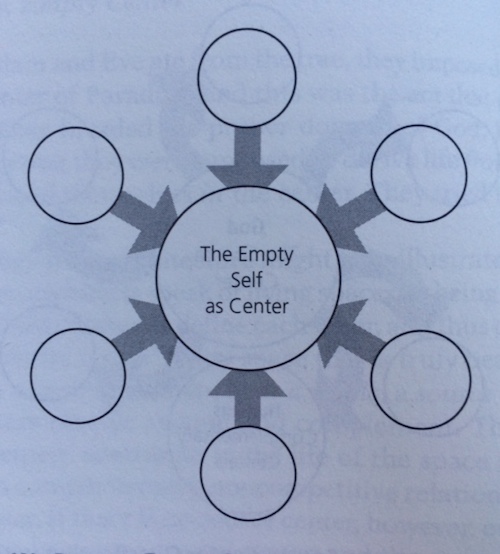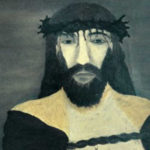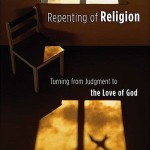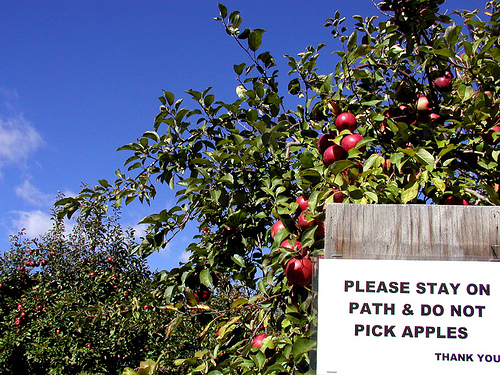We run our website the way we wished the whole internet worked: we provide high quality original content with no ads. We are funded solely by your direct support. Please consider supporting this project.
What Went Wrong in the Garden of Eden?
When Adam and Eve ate from the tree, they imposed their will into the center of Paradise, and this was the act that destroyed Paradise. They invaded the proper domain of God. Instead of recognizing that they were supposed to derive life from the center, they placed themselves in the center. They tried to become “like God.”
The beauty of creation depends on the integrity of the distinction between the complementary centers and the source of the center. The “No Trespassing” sign placed at the center of the garden represents the warning to preserve this boundary and thus the order, beauty, and life of creation. Everything depends on humans remaining humans and not trying to be God—not trying to be their own source center.

Adam and Eve violated this boundary. They thrust themselves into the center of the garden to try to make themselves “wise like God.” They tried to design their own space, as it were, with themselves as the center. And we do the same. We try to make creation—and God—revolve around us. Instead of remaining content being complementary centers, we try to make everything complement us. We attempt to use things and people to derive our worth, meet our needs and expectations, or improve our lives in some way. And we “know good and evil” in the process, for we invariably judge things as “good” or “evil” on the basis of how well they play the idolatrous role we assign them.
Living as the source center means living as judge. But we were not created to function as the source center. We were created to function as complementary centers. We have no life in ourselves to dispense to other centers. Consequently, our center is not one of fullness but of emptiness. Without God as our center, we are not a source of life but a vacuum that sucks life. We can’t radiate life in other centers; we can only try to draw life from them. The world and God revolve around us, and we become a virtual black hole, as depicted by the diagram below.

It is out of the depravity of this black hole that we function as a center, playing God, judging good and evil.
This is life “in the flesh” or life “in Adam.” It is life lived under the serpent’s lie and thus life lived as though we were the center. This way of life is diametrically opposed to God, for it makes it impossible for the fullness of God’s love to flow into us and through us.
In this fallen way of life, people and things have worth only to the extent that they fill us. Instead of ascribing unsurpassable worth to others because the Creator does, we ascribe limited worth to people depending on our judgment of them. Do these people love me? Do they please me? Do they benefit me? Do they affirm me? Do they agree with my opinions? We are the ones who declare that someone or something is good or evil, for we have set ourselves up as the center around which everything revolves and, therefore, the standard against which everything is measured.
—Adapted from Repenting of Religion, pages 68-71
Category: General
Tags: Garden of Eden, Idolatry, Judgment, Repenting of Religion, Sin, Temptation
Topics: Creation Care
Related Reading

Why did God create me with an uncontrollable sex drive?
Question: Why did God create us with far more of a sex drive than we need for reproduction and far more than we can handle to refrain from sex before and outside of marriage? It seems like a cruel joke! Answer: Sex is a wonderful, beautiful, God-glorifying gift. It’s not just for reproduction–it’s also for…

Did the Crucifixion Allow God to Atone for His OWN Sins? (podcast)
Greg considers God’s nature and if he could sin. Dan confesses an old gambling habit. Episode 477 http://traffic.libsyn.com/askgregboyd/Episode_0477.mp3

Where Psychology and Theology Meet
Guest post by Ty Gibson The biblical narrative reveals that God bears our guilt—not merely in the penal sense that Reformed theology asserts—but in the sense that He bears our misconceptions of His character as we project our sins upon Him. To the degree that fallen human beings find it psychologically impossible to bear the…

The Goal For Your Life in 2015
Love is the reason anything exists. God created the world out of love—to express his love and to invite others to share in his love. The central goal of creation is succinctly summed up in a profound prayer Jesus prayed just prior to his crucifixion: For [the disciples’] sake I sanctify myself, so that they…

Quotes to Chew on: God’s Love When We Rebel
“Despite the fall and its consequent curse, however, God’s love was not deterred. God is love. God doesn’t stop being God simply because the humans he created have rebelled against him. God does not abandon his goal of having others share in the eternal, ecstatic dance of the Father, Son and Holy Spirit. The world…

Lighten Up: Other People’s Sins
Cartoon via Adventures of the Holy Ghost Thanks for the heads up @andrewhaak!

